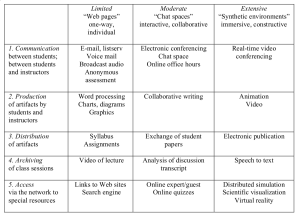Loui, M. C. (2005). Educational Technologies and the Teaching of Ethics in Science and Engineering. Science And Engineering Ethics, 11(3), 435-446.
Main question: ed tech imposes costs (hard/software, licensing, support, training). Whether the benefits justify these costs is an unsettled question. All instructors should assess the effectiveness of their practices.
Term ‘ed tech’ is defined as ‘electronic information technologies that support education’. Including ed tech tools into teaching practice is not a binary yes/no decision. One should examine carefully which functions he needs and at which level. Three levels: limited (e-mail, course website), moderate (interactive, collaborative), extensive (immersive, constructive, simulations, sophisticated animations). The boundaries are not strict and they change over time. ‘What is considered limited today was state-of-the-art twenty years ago’
Five primary functions of ed tech:
– communication
– production of docs, and other artifacts
– distribution of these artifacts
– archiving class sessions
– access to special resources
Concerns: ed tech is accelerating and it is harder than ever to predict the costs which may bring the cost effectiveness down. Ethical issue: state-of-the-art tech cost serious money and can exclude poor people from the mainstream education.
